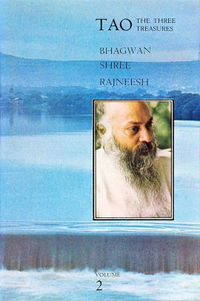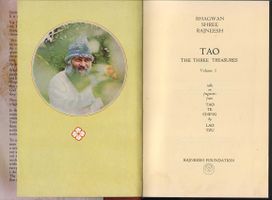Tao: The Three Treasures, Vol 2: Difference between revisions
Jump to navigation
Jump to search
(Add info.) |
mNo edit summary |
||
| Line 2: | Line 2: | ||
description =Osho's affinity with this ancient Chinese mystic is such that he says when he speaks on Lao Tzu he is speaking as if on himself. So clearly does Lao Tzu reflect the unity of opposites, life's absurdities, its ordinariness, and the beauty of that ordinariness, that Osho sees in him a "spokesman for life." In this volume Osho comments on the verses of Lao Tzu and answers questions from disciples and other seekers - Why did you choose a male form as your last one? Please explain the difference between discipline and control. What happens when an enlightened being dissolves into the cosmos? And more. | | description =Osho's affinity with this ancient Chinese mystic is such that he says when he speaks on Lao Tzu he is speaking as if on himself. So clearly does Lao Tzu reflect the unity of opposites, life's absurdities, its ordinariness, and the beauty of that ordinariness, that Osho sees in him a "spokesman for life." In this volume Osho comments on the verses of Lao Tzu and answers questions from disciples and other seekers - Why did you choose a male form as your last one? Please explain the difference between discipline and control. What happens when an enlightened being dissolves into the cosmos? And more. | | ||
translated = | | translated = | | ||
notes = Later published as ''[[Living Tao]]'' | | notes = {{Bookfinder3 | search1 = Tao_The_Three_Treasures_Volume_2.pdf }} | ||
:Later published as ''[[Living Tao]]'' | | |||
period = Jun 21, 1975 to Jun 30, 1975 |year=1975| | period = Jun 21, 1975 to Jun 30, 1975 |year=1975| | ||
nofd = 10 | | nofd = 10 | | ||
Revision as of 07:07, 25 February 2017
- Osho's affinity with this ancient Chinese mystic is such that he says when he speaks on Lao Tzu he is speaking as if on himself. So clearly does Lao Tzu reflect the unity of opposites, life's absurdities, its ordinariness, and the beauty of that ordinariness, that Osho sees in him a "spokesman for life." In this volume Osho comments on the verses of Lao Tzu and answers questions from disciples and other seekers - Why did you choose a male form as your last one? Please explain the difference between discipline and control. What happens when an enlightened being dissolves into the cosmos? And more.
- notes
- Read this book as PDF or create a free account at osho.com to read the book online.
- Later published as part of Osho Books on CD-ROM.
- Later published as Living Tao
- time period of Osho's original talks/writings
- Jun 21, 1975 to Jun 30, 1975 : timeline
- number of discourses/chapters
- 10
editions
Tao: The Three Treasures, Vol 2Talks on Fragments from Lao Tzu's Tao Te Ching
Pages II - III. |


